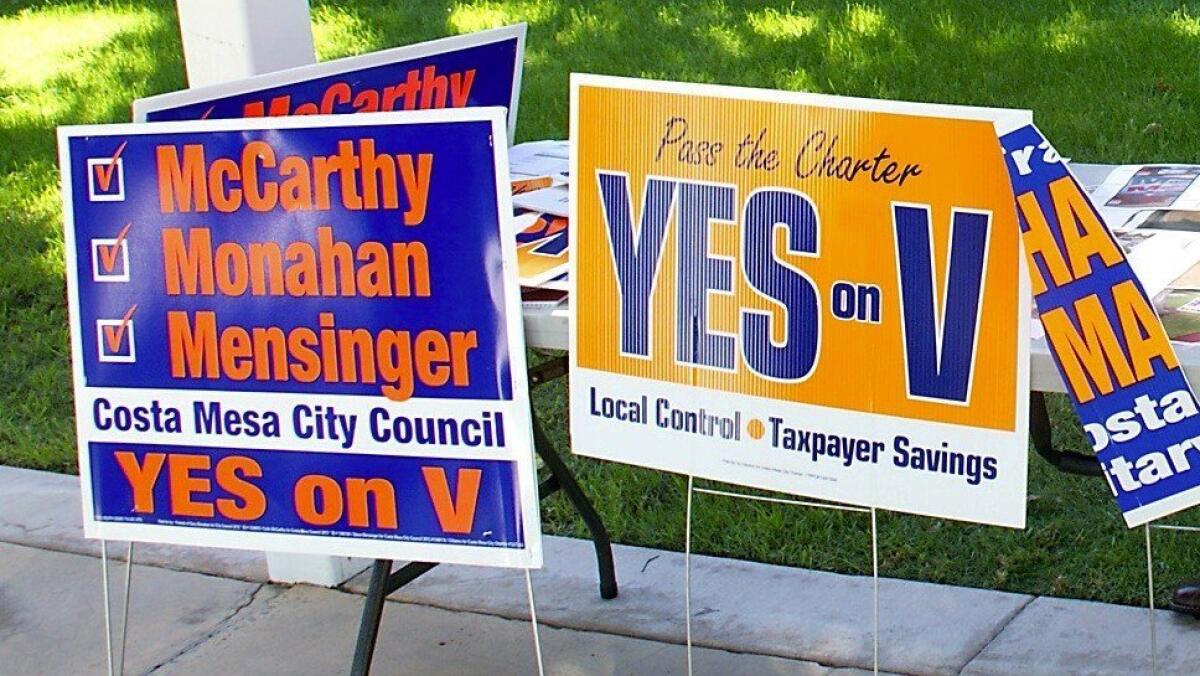Will Costa Mesa elect council members by district? Local voters will decide in November

Costa Mesa voters will be asked in November whether the city should switch from at-large to district-based elections. These campaign signs are from a past election.
Costa Mesans won’t just vote for three City Council members in November — they’ll also decide whether to change the system for choosing city leaders in future elections.
Looking to avoid a threatened voting-rights lawsuit, the council voted 4-0 on Tuesday night to put the question to voters of whether the city should switch to district-based elections. Councilman Gary Monahan was absent during the decision.
In a district-based system, the city would be divided into voting areas, with each area electing a council member to represent it. Currently, the five Costa Mesa council members are elected by voters citywide in a system known as at-large.
“It’s a no-win situation for the council,” said Mayor Pro Tem Jim Righeimer. “The way the law is written, when you have a large enough population, you will go to districts.”
Kevin Shenkman, an attorney with Malibu-based law firm Shenkman & Hughes, has threatened to sue the city if it doesn’t change its election system.
At-large voting in Costa Mesa, Shenkman claims, has led to elections that are “racially polarized,” with Latino voters supporting different candidates than the majority of the electorate.
In a letter the city received Dec. 21, Shenkman alleged that the use of at-large voting violates the California Voting Rights Act of 2001 by diluting the power of the city’s Latino residents to “elect candidates of their choice or otherwise influence the outcome of Costa Mesa’s council elections.”
No Latino candidate has ever been elected to the Costa Mesa City Council, Shenkman said, even though Latinos make up more than one-third of the city’s population.
Given the potentially hefty bill of a voting-rights lawsuit — some cities that have lost such cases have had to pay millions of dollars in legal costs — it makes sense to start the process of moving to voting districts, city officials said.
Voters don’t necessarily have the final say in the matter, however. Even if residents reject district-based elections in November, Costa Mesa still could be at risk of a lawsuit.
“If you don’t go to districts, a judge is going to put you in districts,” Righeimer said.
Mayor Steve Mensinger said he’s concerned that moving to districts could “Balkanize” Costa Mesa.
“We’re all Costa Mesans,” he said. “We’re not District 1 or District 2 or District 3 or District 4 — we’re all here for the community and we’re all here for the betterment of the community. But ultimately, this is what it’s going to be, and I think we’re going to move forward with this as it is and try and work out the quirks as we go along.”
Some residents said moving to districts would help empower communities.
“You want someone that lives around your area, that knows your area, to go up there and fight for your area,” said Eastside resident Luis Bravo. “You need someone who is your neighbor making decisions about your neighborhood.”
With districts, he said, residents would be “able to come here (to City Hall) and talk and have someone that will actually listen to them, not just ignore them.”
Oswaldo Farias, who also lives in the Eastside, said he wants to see the city move to voting districts because, in his mind, “there has historically been a lack of trust and approachability to this council” when it comes to the Latino community.
At-large voting systems have come under fire in recent years from those who claim they dilute the electoral power of minority voters.
“Under the CVRA, at-large voting is sort of going the way of the dinosaur, it appears,” said lawyer Kim Barlow, who negotiated on behalf of the city to avoid a lawsuit by Shenkman in exchange for putting the district system to a public vote. “It is very difficult to defend a case brought under the CVRA and very, very expensive to litigate a case brought under the CVRA.”
Voting-rights lawsuits have been filed or threatened against other cities in Orange County, including Anaheim, Fullerton, Garden Grove and San Juan Capistrano. All have taken steps to move to district-based elections.
Costa Mesa has retained a consultant, Compass Demographics, at an estimated cost of $20,000 to direct the process of creating voting districts. The undertaking will include extensive outreach and community participation, city officials say.
Some residents at Tuesday’s council meeting who seemed lukewarm to the idea of districts said the city needs to pull out all the stops to make sure residents are kept in the loop.
“I’m hoping that you will do a massive outreach to the residents, because this is one issue that affects every single person in our city,” said resident Mary Spadoni.
--
Twitter: @LukeMMoney
